Investing.com - Here are the top five things you need to know in financial markets on Wednesday, June 5:
1. Growth worries remain front and centre
The International Monetary Fund cut its forecast on Chinese growth this year to 6.2%. The decision, that comes just two months it raised its forecast to 6.3%, was based on escalating uncertainty surround the Sino-U.S. trade dispute. That comes on the heels of the World Bank on Tuesday downgrading its global growth forecast for 2019 to just 2.6% from an estimate of 2.9% in January. The World Bank also cut its forecast for 2020 to 2.6% from 3.6%.
The IMF will release its annual review of the U.S. economy on Thursday.
Australia’s economic growth hit a decade low last quarter, according to data released on Wednesday, under pressure from a weak housing market and reduced Chinese demand for commodities. The Australian had central bank cut its benchmark rate to a record low on Tuesday.
Read more: 2 Safe Haven Stocks That Can Withstand Recession Better Than Most - Haris Anwar
2. Stocks ride wave of rate cut hopes
Global stocks moved higher on Wednesday, riding a wave of relief after Federal Reserve Chairman Jerome Powell hinted that the Fed may loosen policy to support the economy.
Powell promised to do what was “appropriate” in response to any trade-related impact on the economy. Investors interpreted the comment as an openness to rate cuts, a dovish shift from a commitment to “patience” with regard to policy changes.
The Dow soared more than 500 points Tuesday, its second best session of the year and U.S. futures pointed to a continuation of the rally on Wednesday. Dow futures gained 139 points, or 0.6%, by 5:39 AM ET (9:39 GMT), S&P 500 futures rose 16 points, or 0.6%, while Nasdaq 100 futures traded up 56 points, or 0.8%.
Investors will have further input from the Fed on Wednesday. Vice Chairman Richard Clarida will open the second day of a Chicago Fed conference, ahead of several appearances from other policymakers.
Elsewhere, Asian stocks were mostly higher, following Wall Street, with Japan’s Nikkei 225 ending 1.8% higher. China’s Shanghai Composite, however, remained pressured by growth worries amid current trade tensions with the U.S. and closed down fractionally.
European bourses also advanced.
3. ISM services PMI expected to hold at 2017 low
Wednesday’s focus on the U.S. economic calendar will be the Institute of Supply Management’s reading of service sector activity for May at 10:00 AM ET (14:00 GMT). The ISM non-manufacturing PMI is expected to remain unchanged at April’s 55.5, its lowest reading since August 2017.
While the reading would still remain above 50, the dividing line between expansion and contraction, analysts see the fall from a 13-month high last September as a sign of weaker economic momentum.
Overnight, China and Australia’s services PMIs were weaker than expected, although the U.K.'s and euro zone's beat expectations.
4. Oil falls deeper into bear market territory with U.S. inventories on tap
Oil prices fell further into bear market territory on Wednesday after a surprise build in U.S. crude stockpiles.
The American Petroleum Institute reported late Tuesday a build of 3.5 million barrels last week. Analysts expect the official government data at 10:30 AM ET (14:30 GMT) will show a draw of 0.8 million barrels.
U.S. crude oil futures lost 62 cents, or 1.2%, to $52.86 by 5:40 AM ET (9:40 GMT), while Brent oil traded down 58 cents, or 0.9%, to $61.39.
Crude accumulated losses of more than 20% from April highs on Tuesday, the definition of a bear market, over fears that a slowing world economy will need less oil.
5. Businesses prep amid Sino-U.S. trade spat
Skyworks Solutions (NASDAQ:SWKS) became the latest chipmaker to suffer from the fallout of the escalating U.S. trade war with China, cutting its quarterly outlook after Tuesday’s market close citing the fact that it could no longer ship products to Huawei.
On the other hand, Chinese companies are reportedly scrambling to solicit waivers on tariffs for imported U.S. goods. The Chinese Ministry of Finance has indicated it could grant some waivers on products such as beef, pork, soybeans or coal.
The moves by business come as China prepares plans to cut exports of rare earth elements vital to much high-tech manufacturing. The U.S. Commerce Department promised to take “unprecedented action” to insure that American companies won’t be cut off from supply.
